Microsoft’s Top Compensated Execs In 2022; Satya Nadella Leads With $55M
Microsoft CEO Satya Nadella’s total compensation was $54.9 million for the fiscal year, about 10 percent more year over year.
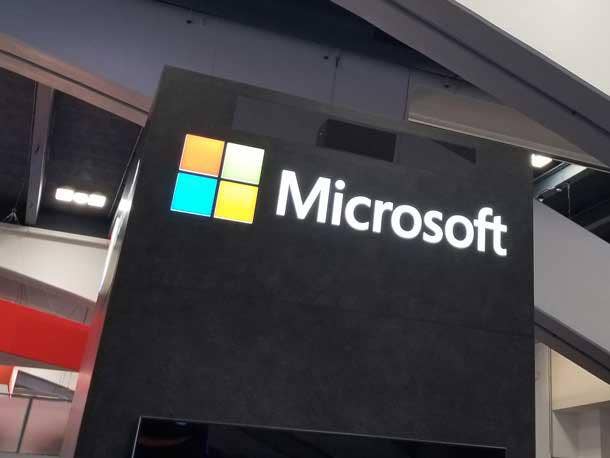
Microsoft CEO and Chairman Satya Nadella’s total compensation surpassed $50 million for the 2022 fiscal year, the tech giant revealed in its latest proxy statement.
Including his base salary, stock awards and non-equity incentive plan awards, Nadella’s total compensation was $54.9 million for the fiscal year, about 10 percent more year over year. The fiscal year for Redmond, Wash.-based Microsoft ended June 30.
The pay packages of four other Microsoft executives were disclosed in filings with the U.S. Securities and Exchange Commission.
[RELATED: Here Were Microsoft’s Top Paid Executives In 2021]
Microsoft brought in $198.3 billion in revenue during fiscal year 2022, an increase of 18 percent year over year. Operating income increased 19 percent to $83.4 billion. Net income increased 19 percent to $72.7 billion, according to the cloud vendor.
Highlights of the fiscal year included Microsoft Cloud revenue of $91.2 billion, up 32 percent year over year, according to the company. Office Commercial products and cloud services revenue increased 13 percent and Office Consumer products and cloud services revenue increased 11 percent.
Click through the slideshow to see how much the top brass at Microsoft reported in total compensation this past fiscal year.
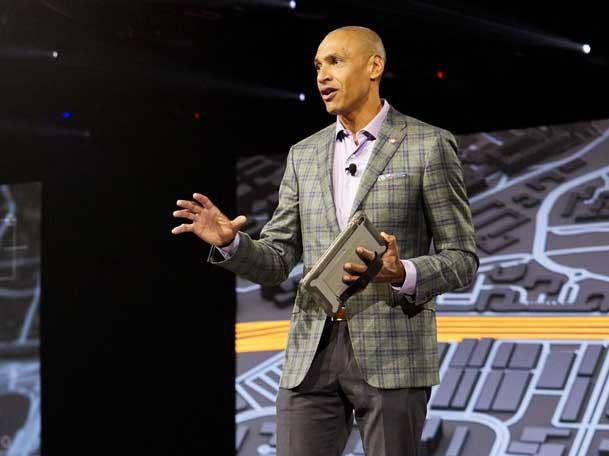
Chris Young
Chris Young, Microsoft’s executive vice president for business development, strategy and ventures, reported total compensation of $11.7 million, about 59 percent less than his pay package the year prior.
Less money in his bonus for the year and lesser value in his stock awards contributed to Young’s lower overall pay package.
The pay package included base pay of $850,000, according to Microsoft. That’s about 57 percent above his base salary the year prior.
Young received a bonus of $1.5 million, part of his on-hire bonus, according to Microsoft. The year before, he received $3.5 million in his on-hire bonus.
“This installment is repayable to Microsoft if Mr. Young resigns his employment, or his employment is terminated for ‘misconduct’ prior to the second anniversary of his employment start date,” according to Microsoft.
His stock awards amounted to a value of $7.1 million, according to Microsoft. The year prior, they were valued at $22.6 million and included an on-hire stock award valued at $17.5 million.
His non-equity incentive plan compensation was $2.1 million, above the $1.8 million he received in 2021.
And Young received $105,000 in “other compensation,” about 50 percent higher than his “other compensation” from the year prior.
Other compensation included about $12,000 in retirement plan contributions and 401(k) plan matching plus $93,000 in charitable gifts and matching charitable contributions.
Young’s accomplishments for the fiscal year included leading “efforts to identify new categories of future growth for Microsoft in partnership with Senior Leadership Team peers, as well as through investments via the M12 Venture Fund,” according to the compensation committee.
He also played major roles in the Xandr acquisition and partnership with Netflix as its global advertising technology and sales partner, among other accomplishments, according to Microsoft.
Microsoft hired Young, former CEO of McAfee, in 2020.
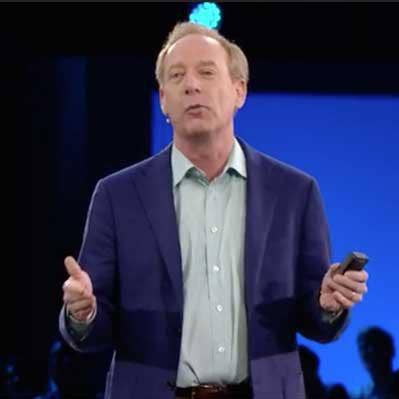
Brad Smith
Brad Smith, Microsoft‘s vice chairman and president, saw a total pay package of $23.4 million, an increase of about 14 percent year over year.
More value in his stock awards and a higher base salary attributed to the larger pay package.
Smith received a base pay of $993,333, about 5 percent – or $50,000 more – than in 2021.
His stock awards were valued at $18.8 million, a 24 percent increase year over year, according to Microsoft.
And he received $3.6 million in non-equity incentive plan compensation, about 17 percent less than the prior year.
Smith received $110,277 in “other compensation,” in line with what he received the year prior.
Other compensation included $10,250 in retirement plan contributions and 401(k) plan matching, plus $100,000 in charitable gifts and matching charitable contributions, according to Microsoft.
Among Smith’s accomplishments for the year, according to the compensation committee, was the launch of “a new initiative to combat disinformation and foreign cyber influence operations, and led the response to the war in Ukraine to defend against cybersecurity attacks.”
Smith “supported important customer privacy protections in the new Trans-Atlantic Data Privacy Framework” and enhanced how Microsoft handles legal requests for customer data, providing more “support for individuals concerned about their rights,” according to Microsoft.
His work in delivering more cybersecurity education and training resulted in reaching “over 30 million people in 249 countries and territories, and specifically for fiscal year 2022, 5.8 million people were trained for jobs and livelihood opportunities in the digital economy,” according to Mcirosoft.
Smith “released the Responsible AI Standard, a set of company-wide rules that help to ensure we are developing and deploying AI technology consistent with our AI principles of fairness, reliability & safety, privacy & security, inclusiveness, transparency, and accountability,” and he “Joined the Carbon Call to lead the efforts to develop reliable and interoperable carbon accounting methodology standards, while making strong progress towards environmental sustainability goals, including reducing scope 1 and 2 emissions by 17 percent while Microsoft’s revenue grew ~18%,” according to Microsoft.
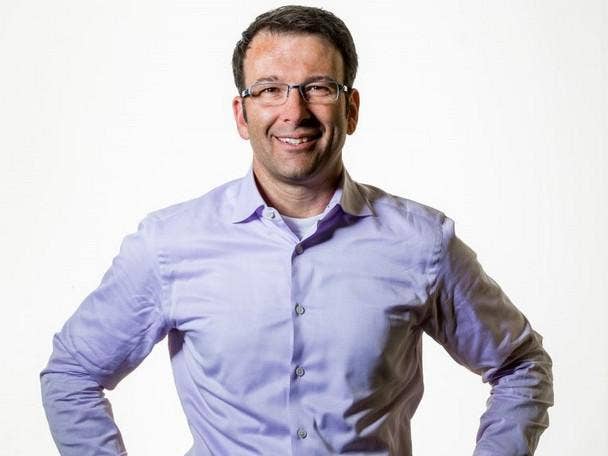
Judson Althoff
Judson Althoff – promoted last year to head a unified Microsoft worldwide commerce group – received $18.8 million in total compensation for the fiscal year, according to Microsoft.
The vendor did not report Althoff’s compensation for the year prior.
Althoff – whose formal title is executive vice president and chief commercial officer – received a base pay of $960,000, according to Microsoft.
Althoff’s stock awards were valued at $14.4 million. He received $3.4 million in non-equity incentive plan compensation. And he received $55,708 in “other compensation.”
His other compensation included $10,300 in retirement plan contributions and 401(k) plan matching plus $1,984 in broad-based plan benefits.
Those benefits include “payments in lieu of athletic club membership and credits for waived life insurance coverage under programs that are available to substantially all our U.S.-based employees,” according to Microsoft.
Althoff’s charitable gifts and matching charitable contributions amounted to $43,000, according to the vendor.
Among Althoff’s accomplishments during the fiscal year, according to the compensation committee, was taking on the leadership role of Microsoft Custom & Partner Solutions (MCAPS).
He made “hundreds of customer and partner engagements” and helped with diversity and sustainability efforts, including launching the Microsoft Cloud for Sustainability.

Amy Hood
Microsoft Executive Vice President and Chief Financial Officer Amy Hood’s total compensation was $26.3 million for the fiscal year, according to Microsoft. Her pay package increased about 12 percent year over year.
Microsoft paid Hood a base salary of $1 million, about $4,000 more than her base salary the prior year.
Hood’s stock awards were valued at $21.7 million, about 20 percent more over the prior year.
She received $3.6 million in non-equity incentive plan compensation, a 21 percent decrease year over year.
Hood received $62,400 in “other compensation,” almost the same as the prior year. That included $10,250 in retirement plan contributions and 401(k) plan matching and $2,165 in broad-based plan benefits. Those benefits include “payments in lieu of athletic club membership and credits for waived life insurance coverage under programs that are available to substantially all our U.S.-based employees,” according to Microsoft.
Hood’s compensation included $50,000 in charitable gifts and matching charitable contributions, according to Microsoft.
Among her accomplishments noted by the compensation committee are “strong financial performance and management with double digit revenue growth of 18% and operating income growth of 19%,” and she “returned total cash to shareholders of $46.6 billion through share repurchases and dividends.”
The committee credited Hood with help on Microsoft’s industry clouds strategy and sustainability efforts, according to the Securities and Exchange Commission filings.
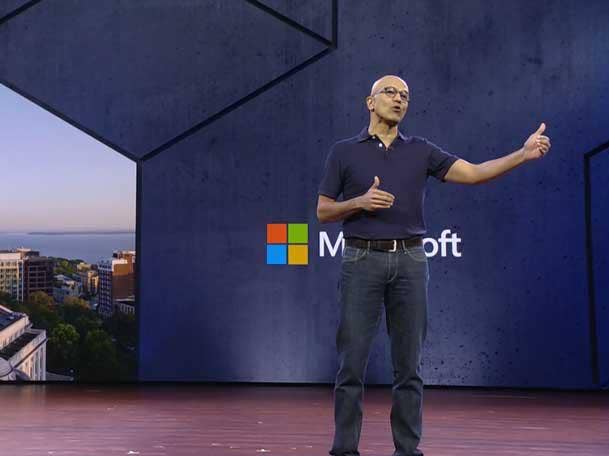
Satya Nadella
Microsoft’s 55-year-old CEO and chairman saw a total pay package of $54.9 million for the fiscal year, according to the vendor. That’s about 10 percent more than the prior year’s total pay package.
Satya Nadella collected a base pay of $2.5 million, unchanged for at least three years now.
Nadella received stock awards valued at $42.3 million, about 28 percent higher than the prior year, according to Microsoft.
His $10.1 million in non-equity incentive plan compensation was about 29 percent lower year over year.
Nadella received $110,250 in “other compensation,” about the same as the prior year. “Other compensation” included $10,250 in retirement plan contributions and 401(k) plan matching. It also included $100,000 in charitable gifts and matching charitable contributions.
Microsoft’s compensation committee and independent board members credited Nadella with leading Microsoft to “strong revenue growth across business lines, including 18 percent growth in Office 365 Commercial, 11 percent growth in Windows Commercial Products and cloud services driven by demand for Microsoft 365, 39 percent growth in Dynamics 365, 45 percent growth in Azure and other cloud services, 34 percent growth for LinkedIn, and our security business reaching annualized revenue of over $15 billion.”
Nadella helped grow Microsoft 365 and Teams as companies adopted hybrid remote work, and he helped make significant “strides in threat intelligence and strengthening the Microsoft “brand” in security,” according to the company.
He led Microsoft “to make 21 new investments and 39 follow-on investments – many in new growth areas – to enable Microsoft to retain its prominence in usage and share growth across existing and new customers,” according to the company.
Nadella closed the Nuance acquisition and “led expansion into new categories, including investments in Consensys (web3) and WAYVE (autonomous transport), which is scaling the development of AI-based models for autonomous vehicles using Azure.”
The committee and board also highlighted Nadella’s efforts in diversity, “with overall representation of women surpassing 30%, at 30.7% globally (+1.0ppts)” and growth among “Asian 35.8% (+0.3ppts); Hispanic and Latinx 7.6% (+0.6ppts); Black and African American 6.6% (+0.9ppts); and Multiracial 2.6% (+0.1ppts).”
The company has already surpassed its 2025 commitment to double the number of Black and African American people managers below director level. It is 92 percent of the way for directors, partners and executives.
Microsoft is 46.5 percent of the way for Hispanic and Latinx commitments for people managers below director level and 57.6 percent of the way for directors, partners and executives.
Nadella’s pay compared to the annual total compensation of the median Microsoft employee was 289-to-one.